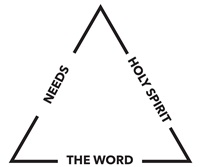Skill Builders
Article
Deepen Your Preaching Barrel by Planning Ahead

When I first became senior pastor of Tenth Church in Vancouver in 1996, I had limited preaching experience. Sundays seemed to hurtle toward me at the speed of sound every three or four days and one of my biggest anxieties was deciding what to preach on. As I look back on my first sermons that summer, I see how I recycled the few sermons I had in my hip pocket. Then I ran out and panic set in. After a couple of months, I felt like I was "scraping the bottom of the barrel" for sermon material. In those days my sermons basically consisted of the Bible text, a football illustration, and a quote from C.S. Lewis.
One of the practices that has made preaching at Tenth Church sustainable, and even life-giving, has been taking time each summer to map out the possible sermon series for the coming year, from September through the end of June (an associate pastor plans our summer series in the spring). I have found that summer is a particularly good time for me to engage in some longer-range sermon planning as I'm able to get away from the day-to-day pressures of ministry and look back over the last year of preaching. I have the space to prayerfully seek God's guidance for the coming year. I typically take two to three weeks for study and planning each summer, then two to three weeks for vacation. (Tim Keller, who served for many years as senior minister of Redeemer Presbyterian Church in NYC, shared with me that he took one month for study in the summer and a month for vacation, and with this yearly rhythm he never felt the need to take a longer sabbatical.)
However, I don't begin my planning for possible sermon series from scratch in the early summer. I keep a "hopper for preaching" file on my computer. Throughout the year, as ideas for sermon series come to mind as I read Scripture, books, and engage in conversations with people, I jot down possible sermon series ideas in this document.
Scripture, needs, Holy Spirit

When I first began preaching I asked Minho Song, the seasoned pastor of Young Nak Church in Toronto, "How can I discern what to preach on a given Sunday?" He drew an image of a triangle and wrote "The Word" on the bottom and explained that the base for our preaching must be Scripture. He then drew another side of the triangle on the left, and wrote "Needs" (of the community). He said, "Ask yourself, 'What are the needs of the people you are going to be preaching to?'" Finally, he wrote, "Holy Spirit" on the right side of the triangle and asked, "What is the Holy Spirit doing in your own heart? What is the Spirt stirring in you?" Ever since, I have used this triangle to assess what to preach, not only on a given Sunday, but when I plan a sermon series.
Wise and seasoned pastors advise preachers to offer their congregants a balanced diet of teaching from both the Old and New Testaments. One of the ways I have sought to achieve this is by preaching a series based on the Old Testament in the fall. So, for example, this past fall I preached a series on the Psalms called "Honest to God." My colleagues and I looked at various Psalms that expressed our emotions honestly to God, such as anger (Psalm 137), envy (Psalm 73) and depression (Psalm 42).
Then during Advent we'll usually have a series leading us to Christmas. In the new year, I'll typically choose a sermon series from one of the gospels which will take us to Easter. This past spring we did a series on the various phrases of the Lord's Prayer. After Easter we'll often do a series either from Acts or the Epistles, which may focus on the Holy Spirit. We're currently in a series on the Spirit-filled life, drawn from the upper room discourse in the Gospel of John as well as selected texts from the Book of Acts.
At our church, the sermons have a kind of Trinitarian emphasis across a given year: in the fall a focus on God the Father, in the spring prior to Easter we look to God the Son, and after Easter we often emphasize the Holy Spirit.
Planning the year
During the summer, I will write out the dates for the Sundays from September to the end of June and map out the series, which includes the date, the text, and the big idea as far as I can determine it. The whole process can take anywhere from three working days to a week.
In the past, I would consult study Bibles and commentaries and come up with a half-page summary for each planned sermon. I found, however, that by the time I actually began to prepare the sermons the summaries felt stale and didn't bear much fruit. So now I simply list the big idea, as best as I can discern it, realizing it may change when I begin preparing the sermon. (The further out you are planning, the more likely those series will change. As I plan in the summer, I am fairly sure of what I'll preach in the fall but less certain of what I'll preach in the spring and so I may have a couple of series options.)
I'm acquainted with pastors who prefer to plan their sermons in either six-month or three-month increments. How far in advance you plan your sermons depends in part on your temperament and the context in which you serve. I have found that the advantage of planning a sermon series for the entire year is that you develop a clear perspective on the arc of the year. The advantage of planning in the summer, particularly if you can combine some study time and then some vacation time after, is that it also gives you the space to do some advanced reading on sermon series that you plan for the coming year. This fall, for example, I anticipate doing a series on Abraham and Sarah. To prepare for it, I plan to read Homer's Odyssey this summer in the hope that my reading will inform a series focusing on our own faith odyssey.
The summer, before I knew I was going to be doing a series on the seven deadly sins, I read Cornelius Plantinga Jr.'s book, Not the Way It's Supposed to Be: A Breviary of Sin. Another summer I read the novel Middlemarch by George Eliot (Mary Anne Evans), which helped inform sermons on "True Greatness." If you're going to preach the Book of Revelation, as we did last year, unless you're a Revelation scholar, you're going to need some time to wade through Greg Beale's commentary or read Darrell Johnson's Discipleship on The Edge: An Expository Journey through the Book of Revelation.
Variety and themes
Another advantage of planning your series long in advance is that it gives you time to evaluate whether or not you're preaching with enough variety and hitting key themes. We're able to ask, "Have we preached from both the Old and New Testament? Have we preached series that are accessible for seekers/new believers and others which challenge longer-time believers?"
In my context, I find it's also important to look back at a few years of preaching each summer and ask myself, "Have I regularly addressed themes such as the Cross, forgiveness, money, sex, work, discipleship, holiness, spiritual practices, community and friendship, justice, witnessing, suffering, and guidance?"
Gordon MacDonald, who for many years was the pastor of Grace Chapel near Boston, said that really bad preachers have one or two sermons they just keep repeating; the good preachers have seven or eight sermons they keep repeating. When you are able to step back and evaluate several years of your preaching, you are better able to discern whether you are preaching with sufficient variety.
Ideally, we will be able to say with the Apostle Paul, as he looked back on his ministry in Ephesus, "I have not hesitated to proclaim to you the whole will of God" (Acts 20:27).
Benefits of planning ahead
There are several benefits from planning your sermons in advance that may not be apparent at first. The most direct is that your sermons will likely become better. When you're anticipating the texts and themes you'll be preaching on, you'll be able to gather diverse, relevant material from your daily readings, experiences, and conversations. As we know, having the right illustration can make a big difference in the sermon. In my article, Hitting Your Creative Peak, I've written how having a longer runway for sermon prep provides time for creative ideas to percolate.
Second, not only will the sermon be better, but the congregation's experience will be better. Your worship and arts teams will have more time to plan musical and artistic elements fostering more unified worship services. Your children's ministry may be able to plan appropriate lessons, too, helping the preaching to sink in across age groups.
Finally, you'll be a better pastor. John Ortberg, pastor of Menlo Park Presbyterian Church in California, once shared with me that when he prepared his sermons closer to Sunday, the unfinished sermon was always in the back of his mind, dominating his subconscious. By preparing his sermons earlier in the week, he became more present to people. When your sermon series are mapped out well in advance, as I write in Taking the Stress out of Sermon Prep, you prime yourself to prepare the individual sermons, and this in turn helps you to be more present to others. A greater sense of peace and prayerfulness flows from this rhythm, too.
I've been at Tenth for more than 20 years now, and I can still find myself wondering—"What will I preach on this year?" or "What can I say that's new and fresh here?" However, when I engage in advance preparation, I'm less likely to feel like I'm scraping the bottom of the barrel because there's more time for the barrel to fill with God's wisdom and insight. When this happens, preaching not only becomes more powerful and fruitful but preparing to preach, while still hard work, becomes more enjoyable as well.
Ken Shigematsu is pastor of Tenth Church in Vancouver, BC and the author of the award-winning, bestseller God in My Everything











